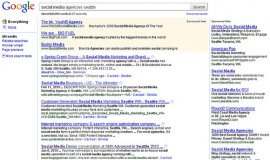Does Google use semantics
 Most folks that are schooled in information retrieval (like my virtual buddy @thegypsy) already know that latent semantic indexing (LSI) is little more than a pipe dream at this point. However, there are still a lot of SEO folks out there that are convinced that LSI is a major factor and spend an inordinate amount of time trying to somehow optimize their sites accordingly.
Most folks that are schooled in information retrieval (like my virtual buddy @thegypsy) already know that latent semantic indexing (LSI) is little more than a pipe dream at this point. However, there are still a lot of SEO folks out there that are convinced that LSI is a major factor and spend an inordinate amount of time trying to somehow optimize their sites accordingly.
I’m no information retrieval expert, but I do recognize anecdotal proof when I see it (at least I think I do). Here’s what I’m referring to specifically…
While browsing through my Google Analytics profile for this blog I happened upon a fairly odd keyword referral:
“social media agencies seattle”
It seemed odd that a blog that is not based in Seattle and rarely makes any mention of Seattle would rank well enough to generate a visitor referral for this term. However, when I took a quick look at the SERPs for this term I noticed that my recent blog post relating to a conversation I had with a “social media denier” while attending SMS Advanced (a conference that was hosted in Seattle) held the No. 5 position in the organic results set.
Note: I logged out of my Google account to counter an ranking effects that personalization might have had on the SERPs (though that might not completely eliminate personalization). Also, I found it interesting that this search referral came from a user based in Seattle, Washington (confirmed via Google Analytics data).
|
An etymological dictionary or analysis of the English language: containing the radicals and definitions of words derived from the Greek, Latin, and French ... and all the generaly used technical eBooks |




 An alphabet is a standard set of letters (basic written symbols or graphemes) which is used to write one or more languages based on the general principle that the letters represent phonemes (basic significant sounds) of the spoken language. This is in contrast to other types of writing systems, such as logographies, in which each character...
An alphabet is a standard set of letters (basic written symbols or graphemes) which is used to write one or more languages based on the general principle that the letters represent phonemes (basic significant sounds) of the spoken language. This is in contrast to other types of writing systems, such as logographies, in which each character...